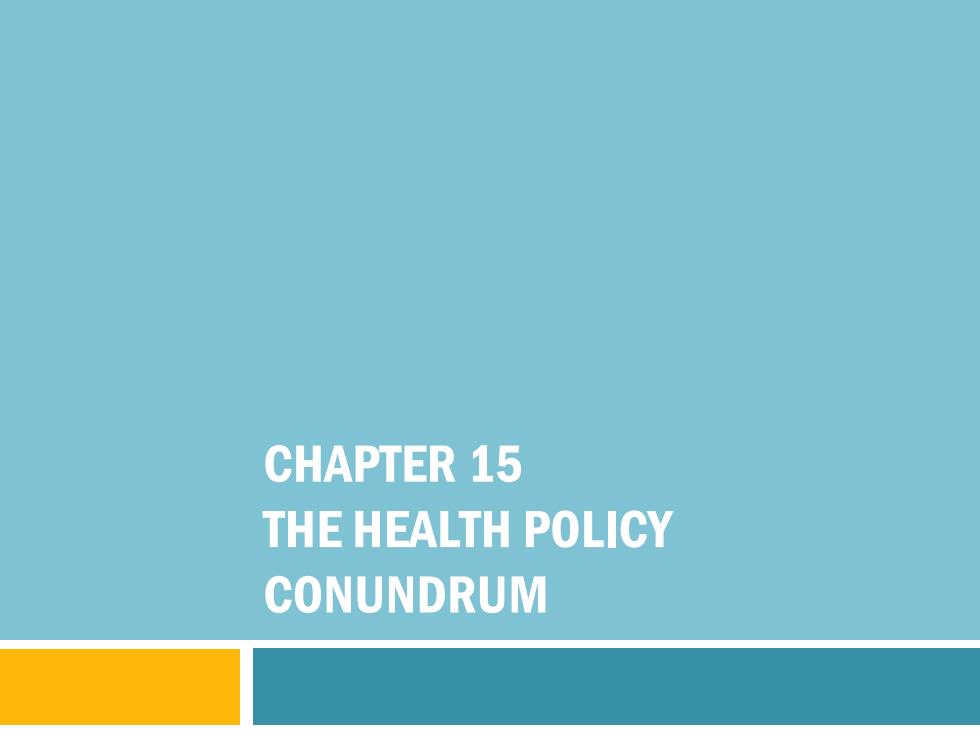
CHAPTER 15 THE HEALTH POLICY CONUNDRUM
CHAPTER 15 THE HEALTH POLICY CONUNDRUM
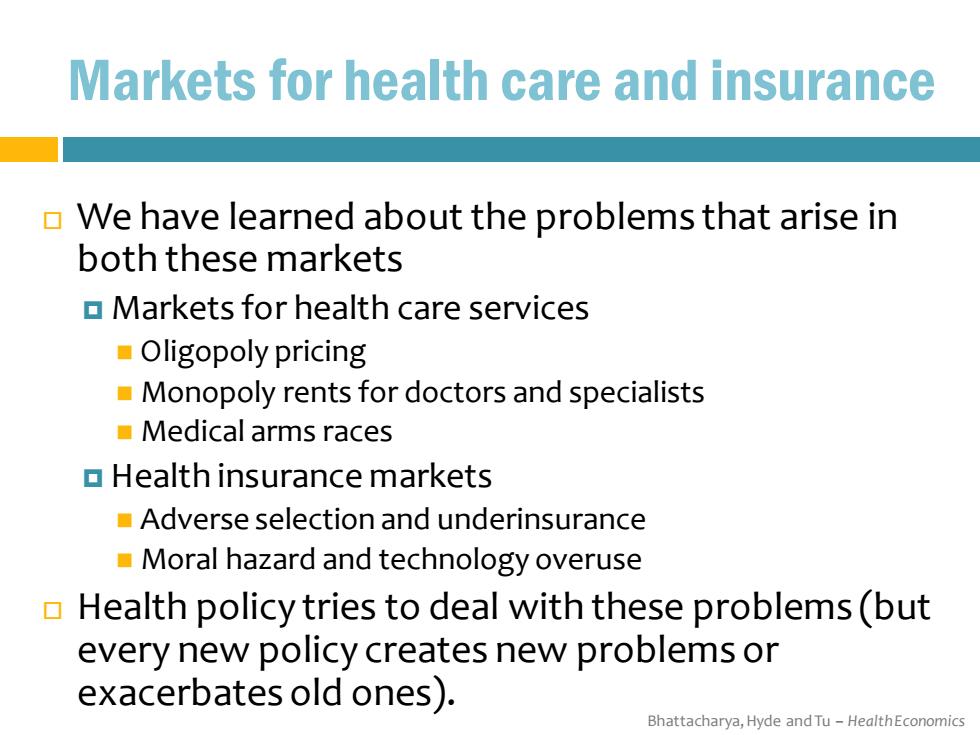
Markets for health care and insurance We have learned about the problems that arise in both these markets Markets for health care services Oligopoly pricing Monopoly rents for doctors and specialists ■Medical arms races Health insurance markets Adverse selection and underinsurance Moral hazard and technology overuse Health policy tries to deal with these problems(but every new policy creates new problems or exacerbates old ones). Bhattacharya,Hyde and Tu-HealthEconomics
Bhattacharya, Hyde and Tu – Health Economics Markets for health care and insurance We have learned about the problems that arise in both these markets Markets for health care services ◼ Oligopoly pricing ◼ Monopoly rents for doctors and specialists ◼ Medical arms races Health insurance markets ◼ Adverse selection and underinsurance ◼ Moral hazard and technology overuse Health policy tries to deal with these problems (but every new policy creates new problems or exacerbates old ones)
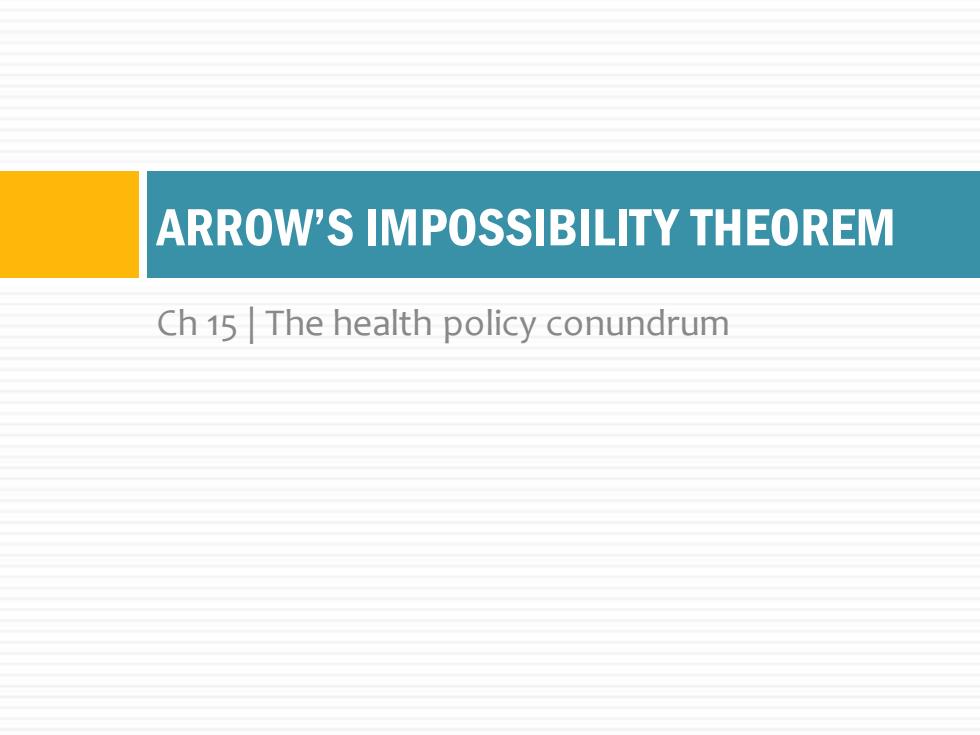
ARROW'S IMPOSSIBILITY THEOREM Ch 15 The health policy conundrum
Ch 15 | The health policy conundrum ARROW’S IMPOSSIBILITY THEOREM
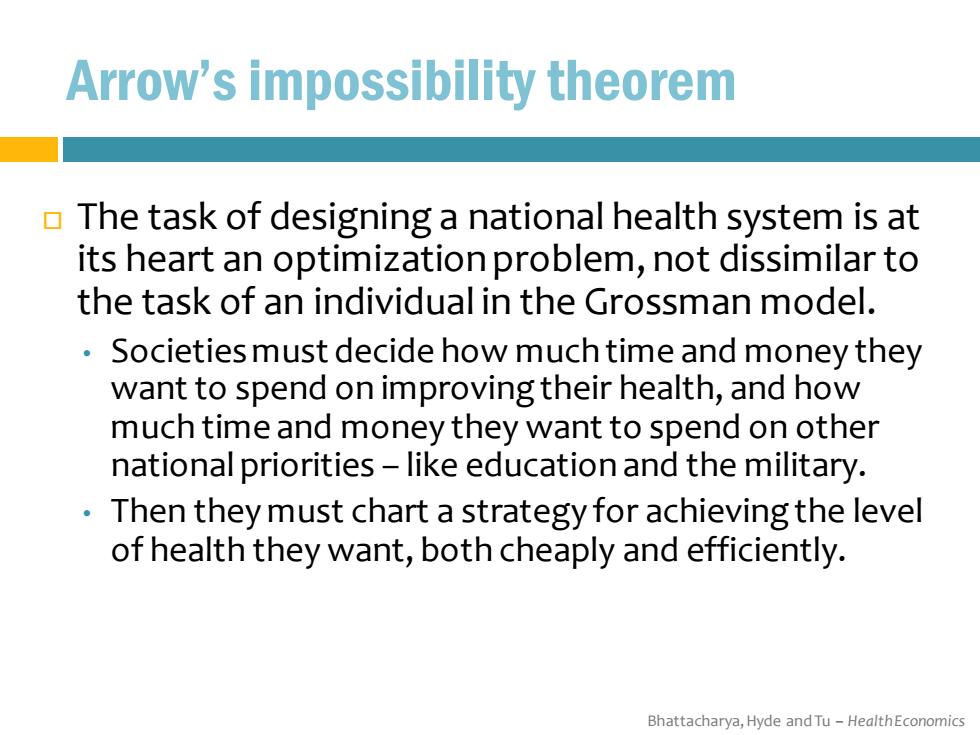
Arrow's impossibility theorem The task of designing a national health system is at its heart an optimization problem,not dissimilar to the task of an individual in the Grossman model. Societies must decide how much time and money they want to spend on improving their health,and how much time and money they want to spend on other national priorities-like education and the military. Then they must chart a strategy for achieving the level of health they want,both cheaply and efficiently. Bhattacharya,Hyde and Tu-HealthEconomics
Bhattacharya, Hyde and Tu – Health Economics Arrow’s impossibility theorem The task of designing a national health system is at its heart an optimization problem, not dissimilar to the task of an individual in the Grossman model. • Societies must decide how much time and money they want to spend on improving their health, and how much time and money they want to spend on other national priorities – like education and the military. • Then they must chart a strategy for achieving the level of health they want, both cheaply and efficiently
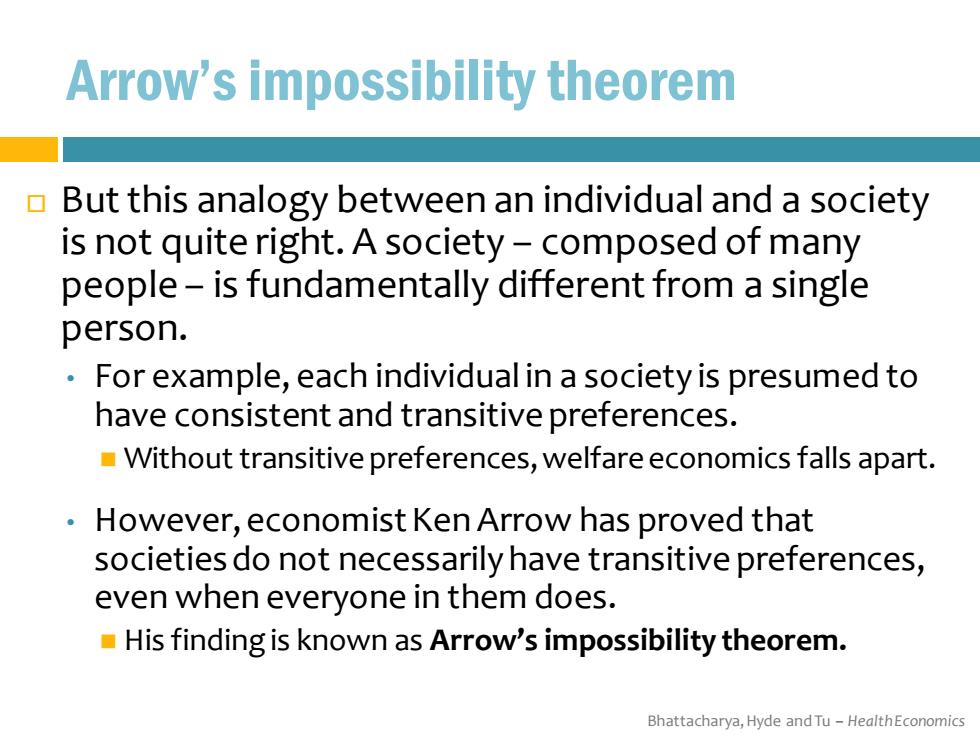
Arrow's impossibility theorem But this analogy between an individual and a society is not quite right.A society -composed of many people-is fundamentally different from a single person. For example,each individual in a society is presumed to have consistent and transitive preferences. Without transitive preferences,welfare economics falls apart. However,economist Ken Arrow has proved that societies do not necessarily have transitive preferences, even when everyone in them does. His finding is known as Arrow's impossibility theorem. Bhattacharya,Hyde and Tu-HealthEconomics
Bhattacharya, Hyde and Tu – Health Economics Arrow’s impossibility theorem But this analogy between an individual and a society is not quite right. A society – composed of many people – is fundamentally different from a single person. • For example, each individual in a society is presumed to have consistent and transitive preferences. ◼ Without transitive preferences, welfare economics falls apart. • However, economist Ken Arrow has proved that societies do not necessarily have transitive preferences, even when everyone in them does. ◼ His finding is known as Arrow’s impossibility theorem
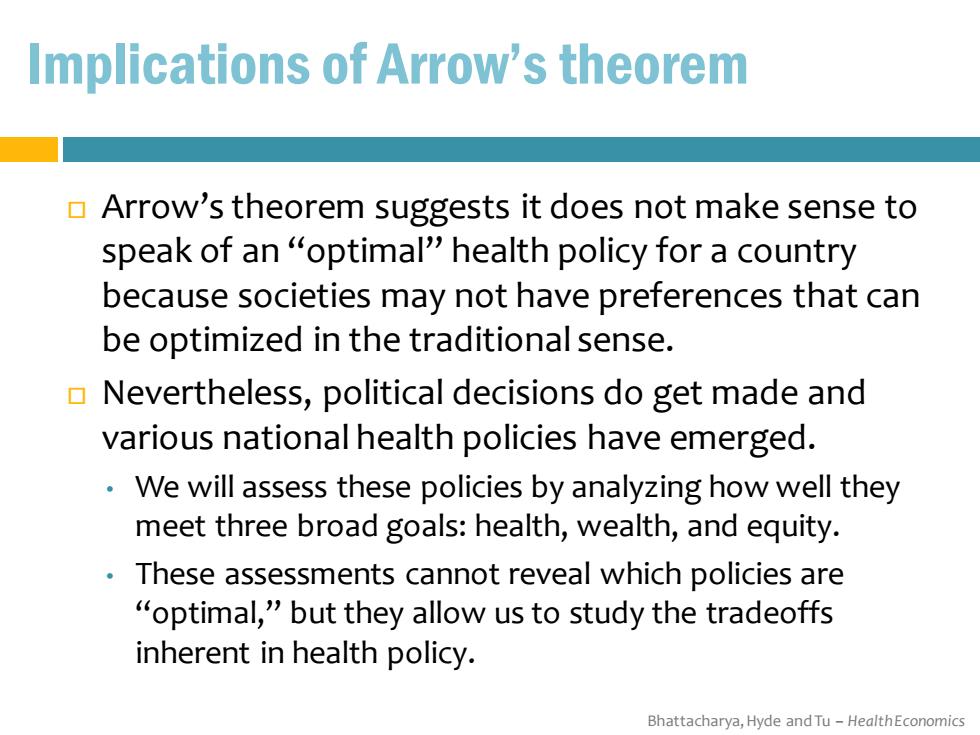
Implications of Arrow's theorem Arrow's theorem suggests it does not make sense to speak of an "optimal"health policy for a country because societies may not have preferences that can be optimized in the traditional sense. Nevertheless,political decisions do get made and various national health policies have emerged. We will assess these policies by analyzing how well they meet three broad goals:health,wealth,and equity. These assessments cannot reveal which policies are "optimal,"but they allow us to study the tradeoffs inherent in health policy. Bhattacharya,Hyde and Tu-HealthEconomics
Bhattacharya, Hyde and Tu – Health Economics Implications of Arrow’s theorem Arrow’s theorem suggests it does not make sense to speak of an “optimal” health policy for a country because societies may not have preferences that can be optimized in the traditional sense. Nevertheless, political decisions do get made and various national health policies have emerged. • We will assess these policies by analyzing how well they meet three broad goals: health, wealth, and equity. • These assessments cannot reveal which policies are “optimal,” but they allow us to study the tradeoffs inherent in health policy
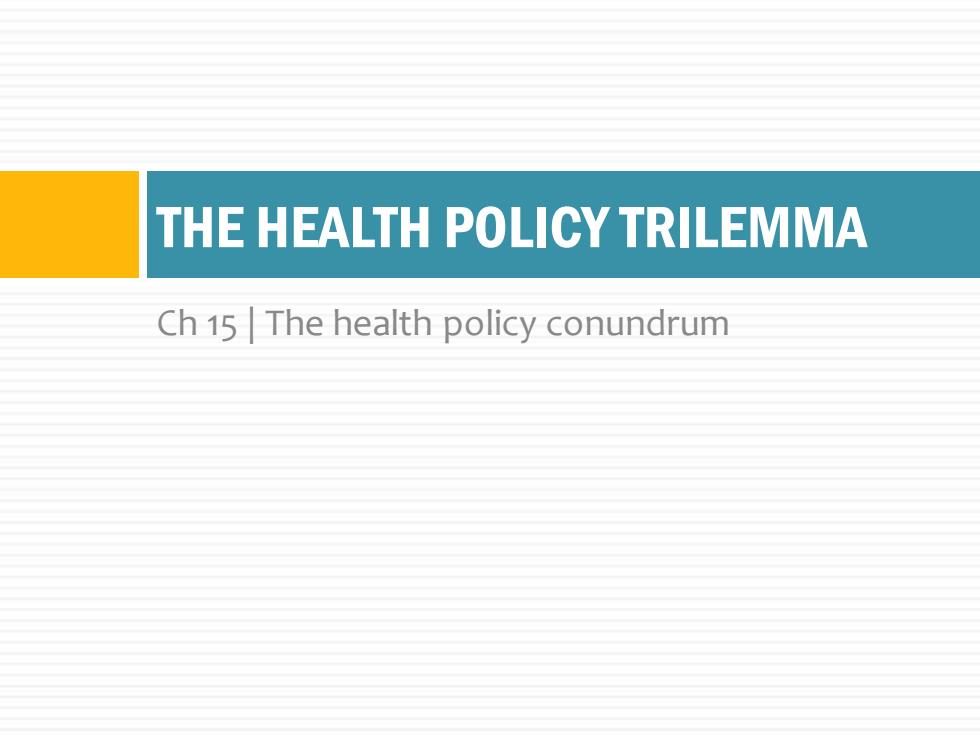
THE HEALTH POLICY TRILEMMA Ch 15 The health policy conundrum
Ch 15 | The health policy conundrum THE HEALTH POLICY TRILEMMA
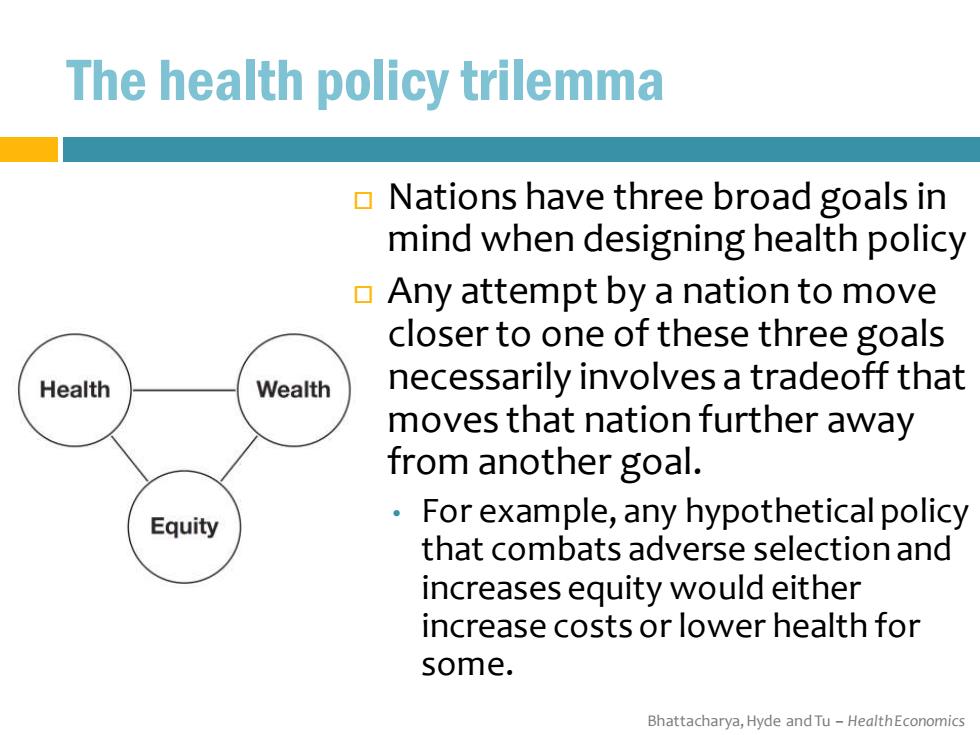
The health policy trilemma Nations have three broad goals in mind when designing health policy Any attempt by a nation to move closer to one of these three goals Health Wealth necessarily involves a tradeoff that moves that nation further away from another goal. Equity For example,any hypothetical policy that combats adverse selection and increases equity would either increase costs or lower health for some. Bhattacharya,Hyde and Tu-HealthEconomics
Bhattacharya, Hyde and Tu – Health Economics The health policy trilemma Nations have three broad goals in mind when designing health policy Any attempt by a nation to move closer to one of these three goals necessarily involves a tradeoff that moves that nation further away from another goal. • For example, any hypothetical policy that combats adverse selection and increases equity would either increase costs or lower health for some
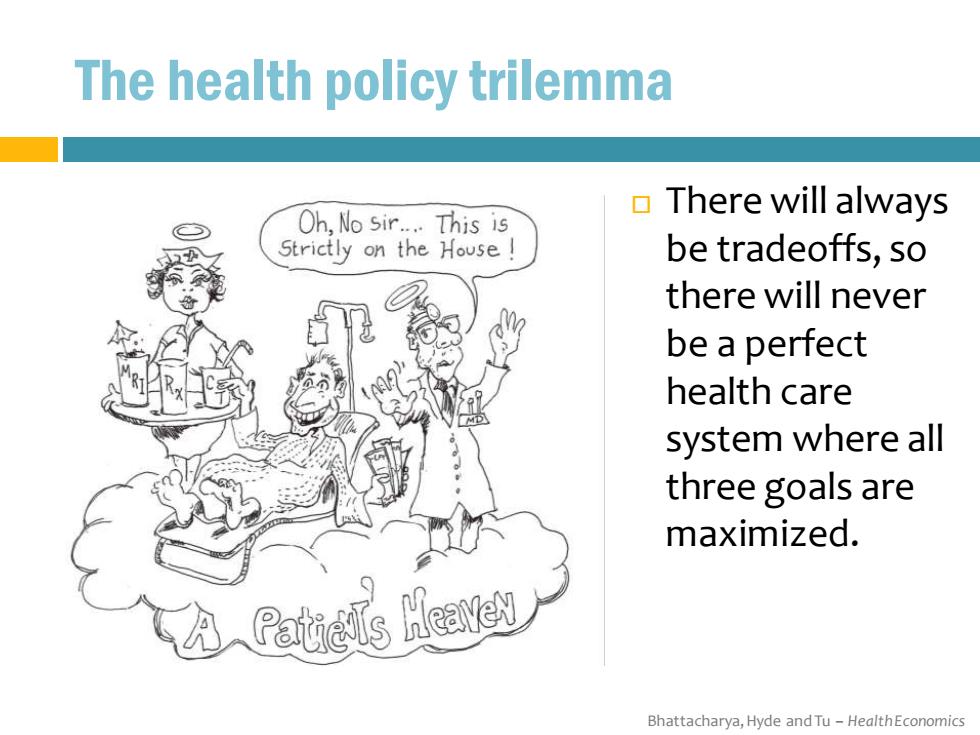
The health policy trilemma Oh,No sir.…This is There will always Strictly on the House be tradeoffs,so there will never be a perfect health care system where all three goals are maximized. Bhattacharya,Hyde and Tu-HealthEconomics
Bhattacharya, Hyde and Tu – Health Economics The health policy trilemma There will always be tradeoffs, so there will never be a perfect health care system where all three goals are maximized
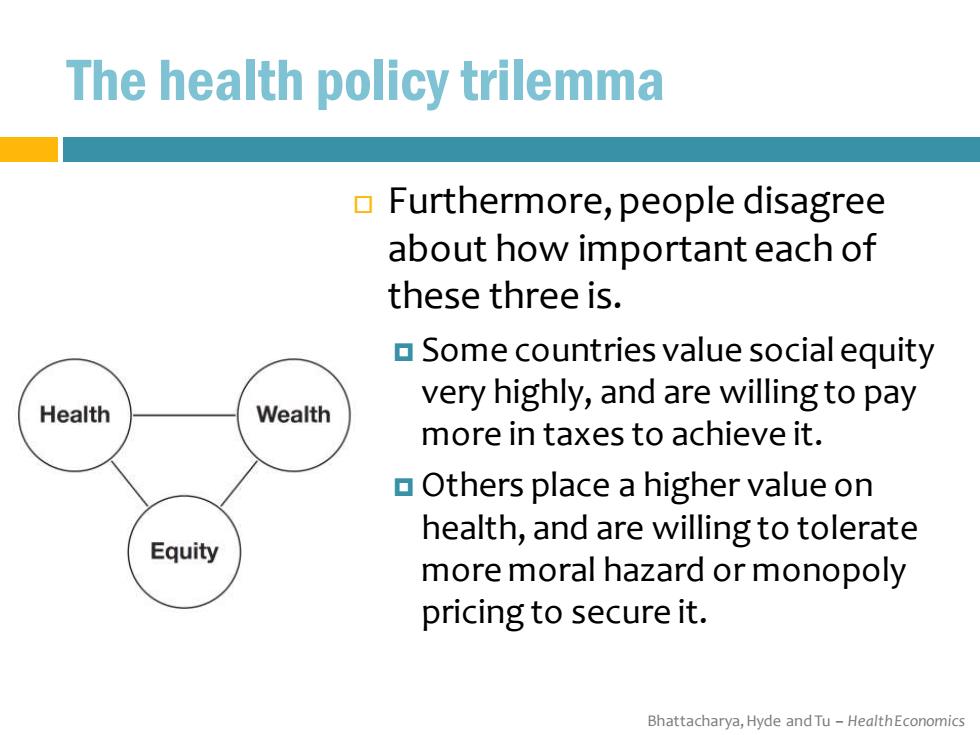
The health policy trilemma Furthermore,people disagree about how important each of these three is. Some countries value social equity very highly,and are willing to pay Health Wealth more in taxes to achieve it. Others place a higher value on Equity health,and are willing to tolerate more moral hazard or monopoly pricing to secure it. Bhattacharya,Hyde and Tu-HealthEconomics
Bhattacharya, Hyde and Tu – Health Economics The health policy trilemma Furthermore, people disagree about how important each of these three is. Some countries value social equity very highly, and are willing to pay more in taxes to achieve it. Others place a higher value on health, and are willing to tolerate more moral hazard or monopoly pricing to secure it